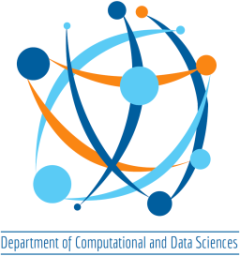DEPARTMENT OF COMPUTATIONAL AND DATA SCIENCES
M.Tech Research Thesis Colloquium
__________________________________________________________________________________________
Speaker: Mr. Dibya Jyoti Nayak
S.R. Number: 06-18-01-10-22-21-1-19747
Title: “A co-kurtosis tensor based featurization for scalable combustion simulations.“
Research Supervisor: Dr. Konduri Aditya
Date & Time: August 21, 2023 (Monday) at 10:00 AM
Venue: # 102 CDS Seminar Hall
__________________________________________________________________________________________
Abstract
Identifying low-dimensional representations of the thermo-chemical state space for turbulent reacting flow systems is vitally important, primarily to significantly reduce the computational cost of device-scale combustion simulations. Moreover, these simulations are often performed to gain fundamental insights into the inception of extreme/anomalous events such as flashbacks, flame extinction, blow-offs, thermoacoustic instabilities, etc., which can have detrimental effects on combustion efficiency and engine performance. With the scale of scientific investigations ever increasing, the need for robust anomaly detection methods becomes increasingly critical for judicious steering of these simulations and also aiding smooth operations of practical engines. Recent studies have shown that the fourth-order joint statistical moment tensor, i.e., co-kurtosis, effectively captures anomalies/outliers in scientific data. Accordingly, the primary objective of this work centers around leveraging the unique properties of the co-kurtosis tensor to drive low-cost and scalable combustion simulations and build robust algorithms for extreme event detection. Particularly, the first part of this work develops tools for dimensionality reduction for chemistry, while the second part focuses on employing a co-kurtosis based detection algorithm for capturing extreme events such as flame instabilities in hydrogen-fired reheat burners relevant to sequential gas turbine engines.
To obtain low-dimensional manifolds (LDMs) that describe the original thermo-chemical state, principal component analysis (PCA) and its variants are widely employed. An alternative dimensionality reduction technique that focuses on higher order statistics, co-kurtosis PCA (CoK-PCA), has been shown to provide an optimal LDM for effectively capturing the stiff chemical dynamics associated with spatiotemporally localized reaction zones. While its effectiveness has only been demonstrated based on a priori analyses with linear reconstruction, in this work, we employ nonlinear techniques to reconstruct the full thermo-chemical state and evaluate the efficacy of CoK-PCA compared to PCA. Specifically, we combine a CoK-PCA-/PCA-based dimensionality reduction (encoding) with an artificial neural network (ANN) based reconstruction (decoding) and examine, a priori, the reconstruction errors of the thermo-chemical state. We employ three combustion test cases representing varying degrees of complexity in the geometrical domain, combustion regimes, ignition kinetics, etc., to assess CoK-PCA/PCA coupled with ANN-based reconstruction. Results from the analyses demonstrate the robustness of the CoK-PCA based LDM with ANN reconstruction in accurately capturing the data, specifically from the reaction zones.
Hydrogen’s highly reactive and diffusive nature towards decarbonization is prone to flashbacks, flame instabilities, and thermoacoustic instabilities. For example, in the case of reheat burners of hydrogen-fired sequential gas turbine engines, intermittent temperature and pressure fluctuations result in flame instabilities, such as intermittent autoignition events at off-design locations that can adversely impact the engine’s performance. To address this issue, we develop an unsupervised learning methodology based on the co-kurtosis tensor to detect the early onset of spontaneous ignition kernels in lean premixed hydrogen combustion at vitiated conditions. The accuracy of the model is evaluated for various ignition test cases.
===============================================================================
ALL ARE WELCOME



